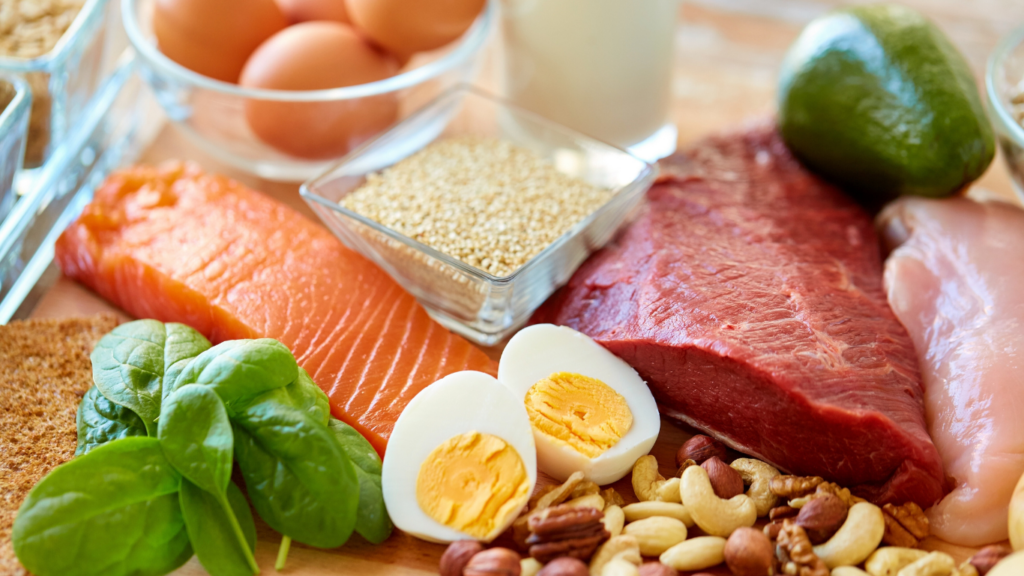Importance Of Proper Nutrition For Athletes
Proper nutrition directly affects athletic performance, recovery, and endurance. Eating nutrient-dense foods ensures stable energy levels during intense training or competition. Athletes relying on poor diets often experience fatigue, reduced stamina, and higher injury risks.
Maintaining a balanced macronutrient intake supports muscle repair, energy replenishment, and immune function. For example, carbohydrates act as the primary energy source, proteins aid in muscle recovery, and fats serve as long-term energy reserves. Ignoring even one macronutrient creates imbalances that hinder performance.
Micronutrients, such as vitamins C and D, and minerals like calcium and magnesium, facilitate essential bodily functions, including recovery processes and bone health. Neglecting them may lead to deficiencies, impairing an athlete’s ability to train consistently or recover fully.
Hydration is equally vital since fluid loss through sweat impacts temperature regulation and muscle function. Even mild dehydration can significantly reduce physical output. Incorporating water or electrolyte-based drinks ensures proper hydration during extended activities.
Strategic meal timing before and after exercise enhances performance and accelerates recovery. Pre-workout meals fuel activity, and post-workout nutrition replenishes glycogen stores and promotes muscle repair. Missing these critical windows reduces training efficiency.
Optimal nutrition avoids the pitfalls of over-reliance on supplements or fad diets, aligning dietary choices with evidence-based practices for sustained progress.
Common Nutrition Mistakes Made By Athletes
Athletes often face challenges in maintaining proper nutrition, which negatively impacts performance and recovery. Addressing these mistakes is crucial to unlock full athletic potential.
Skipping Meals Or Under-Eating
Missing meals or undereating disrupts energy balance, impairing training and recovery. Energy deficits reduce glycogen stores and lead to muscle fatigue, limiting endurance. For example, skipping breakfast can result in lower performance during morning training sessions. Prioritizing consistent, nutrient-dense meals maximizes energy levels and supports muscle repair.
Over-Reliance On Supplements
Excessive dependence on supplements can leave nutritional gaps and cause imbalances. Replacing whole foods with supplements reduces intake of natural fiber, vitamins, and minerals. For instance, using protein powders instead of diverse protein sources can deny the body essential amino acid profiles. I focus on whole foods first and use supplements to complement, not replace, my diet.
Poor Hydration Practices
Dehydration reduces strength, endurance, and mental focus. Losing even 2% of body weight due to sweat negatively affects performance. Neglecting proper hydration before, during, and after workouts increases the risk of cramps or heat exhaustion. I monitor fluid intake and include electrolytes during prolonged activity to restore balance.
Inadequate Recovery Nutrition
Failing to refuel post-exercise delays muscle recovery. Without carbohydrates, glycogen replenishment slows, and insufficient protein intake hinders muscle repair. For example, skipping a post-workout snack can prolong soreness and fatigue. Consuming a carb-to-protein ratio of around 3:1 within 30 minutes post-exercise optimizes recovery.
Ignoring Individual Needs
Generalized diets fail to address unique physiological differences. Factors like:
- metabolism
- activity level
- intolerance
impact nutritional requirements. Adopting one-size-fits-all plans or ignoring medical conditions undermines progress. I assess my specific needs through professional guidance or self-monitoring to create a tailored approach.
How To Avoid Common Nutrition Mistakes

Athletes can improve performance and recovery by addressing key nutritional gaps. Focus on practical strategies that cater to energy and nutrient requirements for optimal results.
Prioritize Balanced Meal Planning
A well-balanced meal plan includes a variety of macronutrients and micronutrients. I ensure meals provide carbohydrates, like oats or sweet potatoes, for energy; proteins, such as chicken or tofu, for repair; and healthy fats, like avocado or nuts, for sustained energy. I avoid under-eating by scheduling meals throughout the day, preventing energy dips or muscle loss.
Stay Hydrated Effectively
Hydration supports endurance, thermoregulation, and recovery. I monitor fluid intake by consuming 0.5 to 1 ounce of water per pound of body weight daily, adjusting for sweat loss during intense activity. For prolonged training, I incorporate electrolyte-rich drinks to replenish sodium, potassium, and magnesium.
Understand The Role Of Timing In Nutrition
Proper timing enhances performance and recovery. I eat carbohydrate-rich foods 1-3 hours before workouts for energy and consume protein-rich snacks, like Greek yogurt or a protein shake, within 30 minutes post-exercise to accelerate muscle repair. Late-night meals, if training late, include easily digestible options to avoid sleep disruptions.
Consult With A Nutrition Professional
Customized advice aligns nutrition with specific goals and training demands. I work with a registered dietitian or sports nutritionist to address my unique physiology, performance targets, and dietary preferences. Personalized plans reduce guesswork and optimize results.
Tips For Long-Term Nutritional Success
- Prioritize Meal Preparation
I plan and prepare my meals in advance to ensure I consistently meet my nutritional needs. Pre-cooking protein sources, portioning snacks like nuts or fruits, and organizing meals with balanced macronutrients save time and reduce the temptation to choose less nutritious options during busy schedules. - Focus On Nutrient Variety
I include a wide variety of whole foods in my diet—vegetables like spinach and broccoli, whole grains like quinoa and oats, lean proteins like chicken and beans, and healthy fats like avocado and olive oil. This approach ensures I get all essential nutrients for energy, recovery, and immune support. - Monitor Portion Sizes
I control portion sizes based on my activity level to avoid over- or under-eating. A food scale or tracking app helps measure intake accurately, especially for calorie-dense foods like nuts or oils. Adjusting portions on rest versus training days helps align with my energy expenditure. - Hydrate Consistently
I drink water consistently throughout the day, not just during workouts. For sessions lasting over an hour, I incorporate electrolyte drinks to replace sodium and potassium lost in sweat. Adequate hydration supports endurance, focus, and recovery. - Time Nutrient Intake Properly
I consume meals or snacks at optimal times, such as complex carbohydrates a few hours pre-exercise for energy or protein-rich foods within 30 minutes post-exercise for muscle repair. This timing maximizes my training outcomes and minimizes muscle soreness. - Evaluate Progress Regularly
I assess my energy levels, physical performance, and recovery rate to identify any nutritional gaps. Adjustments, like increasing protein intake after high-intensity weeks, help me maintain steady progress. Tracking tools or journaling support consistent evaluation. - Seek Professional Guidance
I consult with registered dietitians or sports nutritionists to refine my eating plan. They analyze my individual needs and create tailored recommendations, reducing trial and error while optimizing my long-term results. - Avoid Overly Restrictive Diets
I avoid elimination diets unless medically necessary, as they often lead to deficiencies or cravings. A flexible eating plan that balances treats and nutrient-dense foods promotes adherence and overall satisfaction. - Invest In Education
I stay informed about evidence-based nutrition practices through reliable sources like academic journals or certified organizations. Continuous learning helps me adapt my strategy as new research emerges and as my goals evolve. - Maintain Consistency Over Perfection
I focus on being consistent in my dietary habits rather than striving for perfection. Small, sustainable changes—like reducing processed foods or increasing vegetable intake—create long-term success without overwhelming adjustments.





